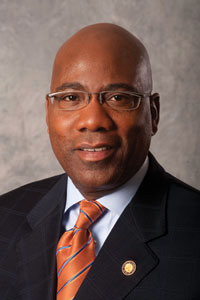Dr. David Wilson to Speak at CCBP Awards

Dr. David Wilson is the twelfth president and the tenth full-term president of Morgan State University. Appointed to the presidency on July 1, 2010, he brings to the University a background of extensive experience, a wealth of skills, a long trail of accomplishments as educational leader and an exceptional appreciation for, and strong devotion to, Morgan’s educational tradition.
President Wilson holds the bachelor’s degree in political science and the master’s degree in student personnel administration from Tuskegee Institute (now Tuskegee University) and both the master’s degree in educational planning and administration and the doctorate in administration, planning and social policy from Harvard University.
He joins the Morgan community after more than thirty years of experience in higher education at Tuskegee Institute, Radcliff College, Kentucky State University, Rutgers-The State University of New Jersey, Auburn University and the University of Wisconsin, as well as at the Research and Development Institute of Philadelphia, Massachusetts General Hospital and the Woodrow Wilson National Fellowship Foundation.
In addition to teaching for a number of years at Rutgers, Dr. Wilson has gained administrative experience and established a record of effective administration in a variety of positions: Assistant to the Associate Dean of Students, Project Director, Research Associate, Director of Minority Programs, Assistant and Associate Provost and Vice President for University Outreach. Most recently, Dr. Wilson served as Chancellor for the University of Wisconsin Colleges and the University of Wisconsin- Extension.
In addition to establishing a record as an educational leader, Dr. Wilson has also accumulated a significant profile as scholar and authority on issues in higher education. He has authored more than twenty scholarly articles on successful university-community partnerships, the challenges facing African-Americans in the 21″ century, social and economic inequality, diversity and tolerance in higher education, federal aid to local education systems, athletes as role models, the effects of racial stereotypes on African-American men, and desegregation in higher education; and he has coauthored two books on higher education: Opening the American Mind: Race, Ethnicity and Gender in Higher Education (with G. Sill and M. Chaplin 1993) and University Outreach: University Connections to Society (with R. Foster 2000).
A world traveler who has visited or served as educational consultant in Europe and over twenty countries around the world-including China, Puerto Rico, Brazil, Egypt, Namibia, Kenya, Zambia, Tanzania, Zimbabwe, South Africa, Hong Kong, South Korea and Japan-as well as the Caribbean, David Wilson has also served on accreditation review boards for many American and international universities and as consultant to the United Negro College Fund, Ayers & Associates and Lucent Technologies. He has also served on the boards of civic, cultural, community and philanthropic organizations across the nation. The winner of numerous awards-including the Woodrow Wilson National Fellowship Foundation Administrative Fellowship, the Salzburg Seminar Fellowship, the Kellogg Foundation National Fellowship, and the “America’s Best and Brightest Young Business and Professional Men” Award of Dollars and Sense magazine-David Wilson was recognized in 1998 as one of the nation’s top 100 leaders in higher education.
In February 2010, President Barack Obama appointed him to his l l-member Board of Advisors on Historically Black Colleges and Universities. Dr. Wilson’s qualifications to lead Maryland’s Public Urban University are clearly outstanding, but it is the special character that he brings to higher education in Maryland, a character shaped by the intangibles of his background, that is perhaps most impressive and makes him suitable for this new role. Dr. Wilson grew up with nine siblings on a sharecropper farm outside the small town of McKinley, Alabama. Through hard work, tenacity and the encouragement of his father and his teachers, he became the first person in his family to attend college.
Therefore, he comes to Morgan with a special sensitivity for students from similar backgrounds and an appreciation of the challenges that many urban and minority students face as they pursue a college degree. He brings to Morgan the strong educational philosophy always to put the students’ experience first and an equally strong commitment, as a leader, to be a consensus builder and a strong advocate of administrative transparency.
His goal is to make Morgan a leader in producing the next wave of innovators in the U.S. and to create at Morgan an atmosphere where “people don’t see what they do as a job” but rather as “a calling.” The theme of his leadership of Morgan is “Growing the Future, Leading the World.”